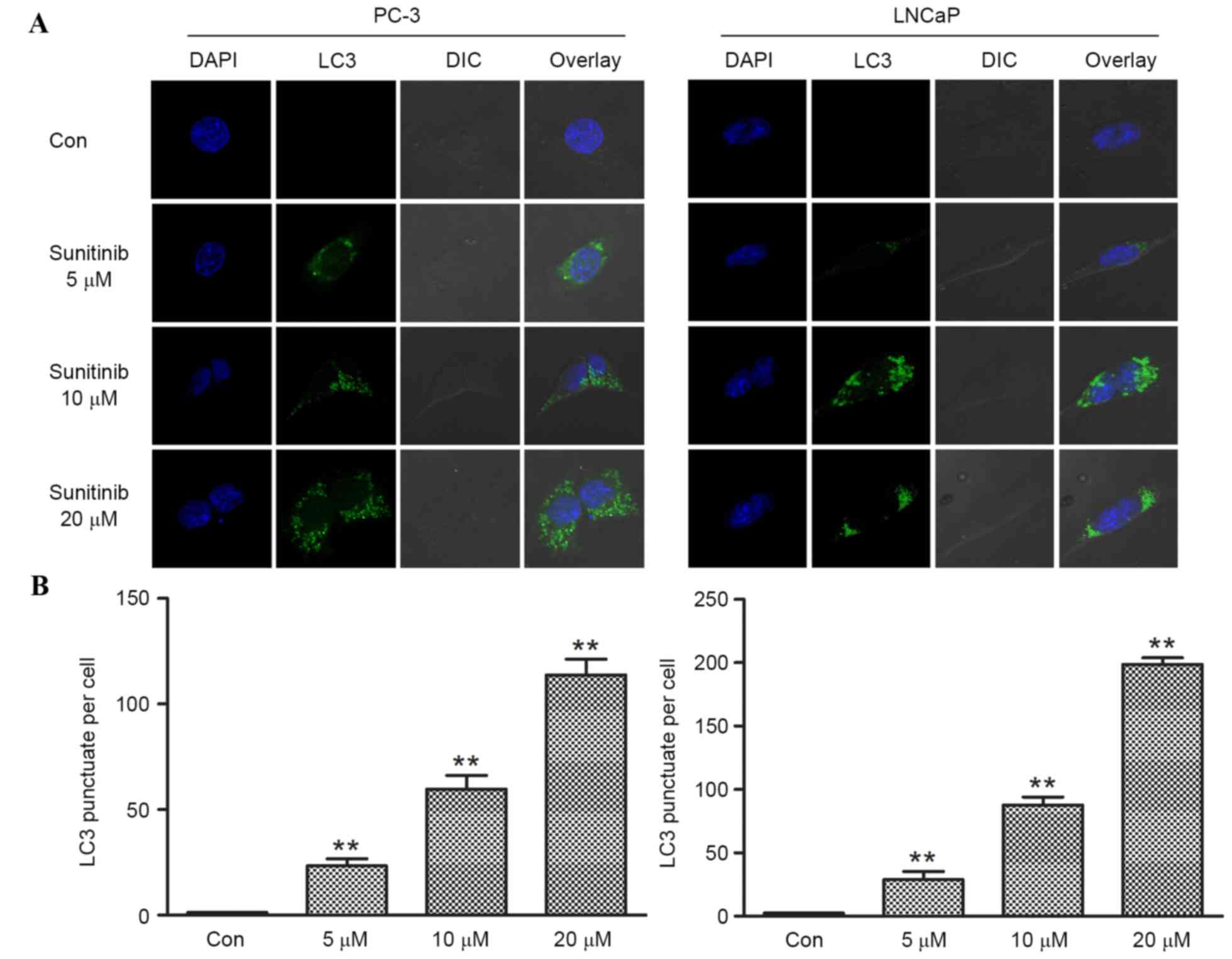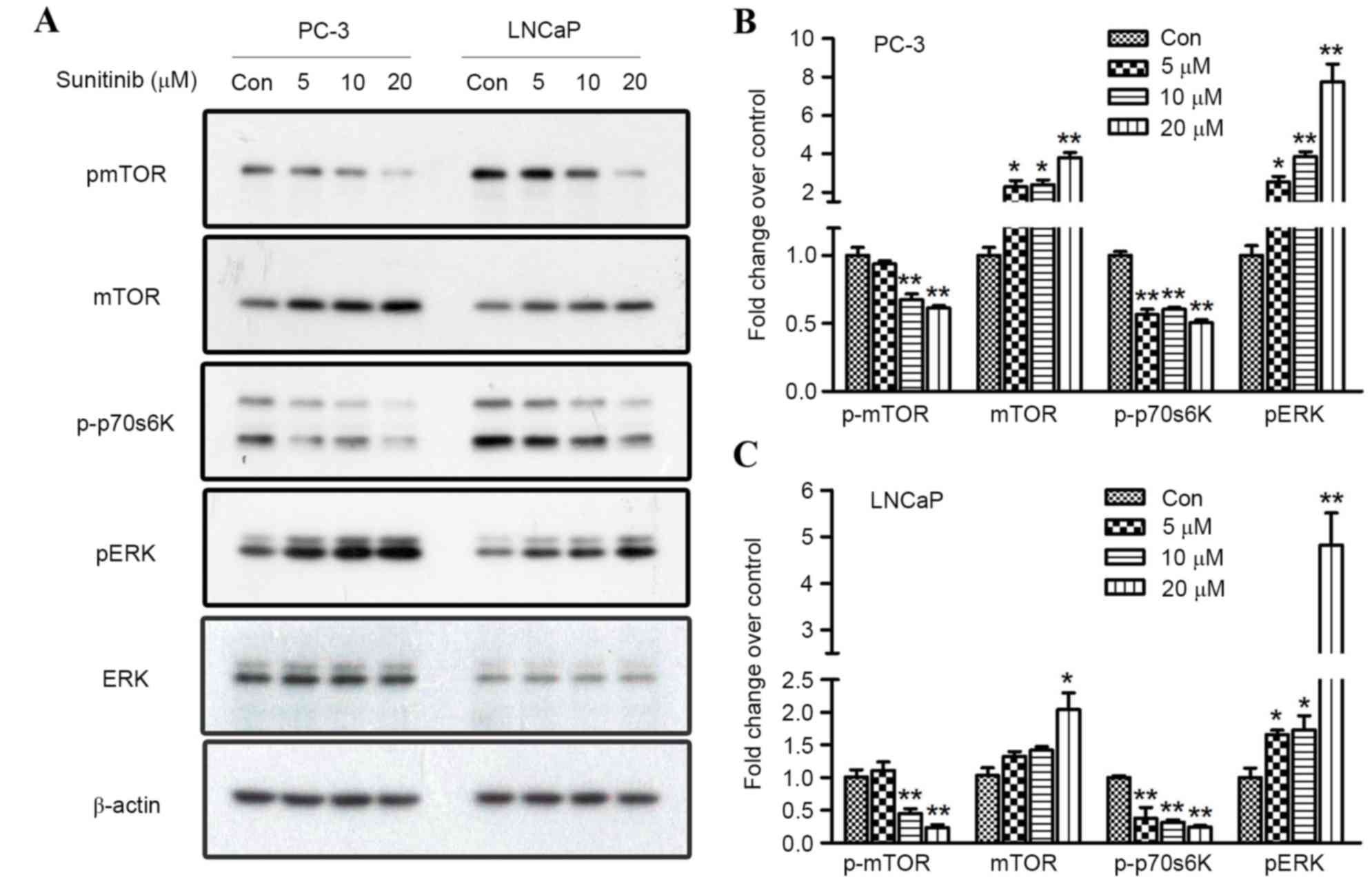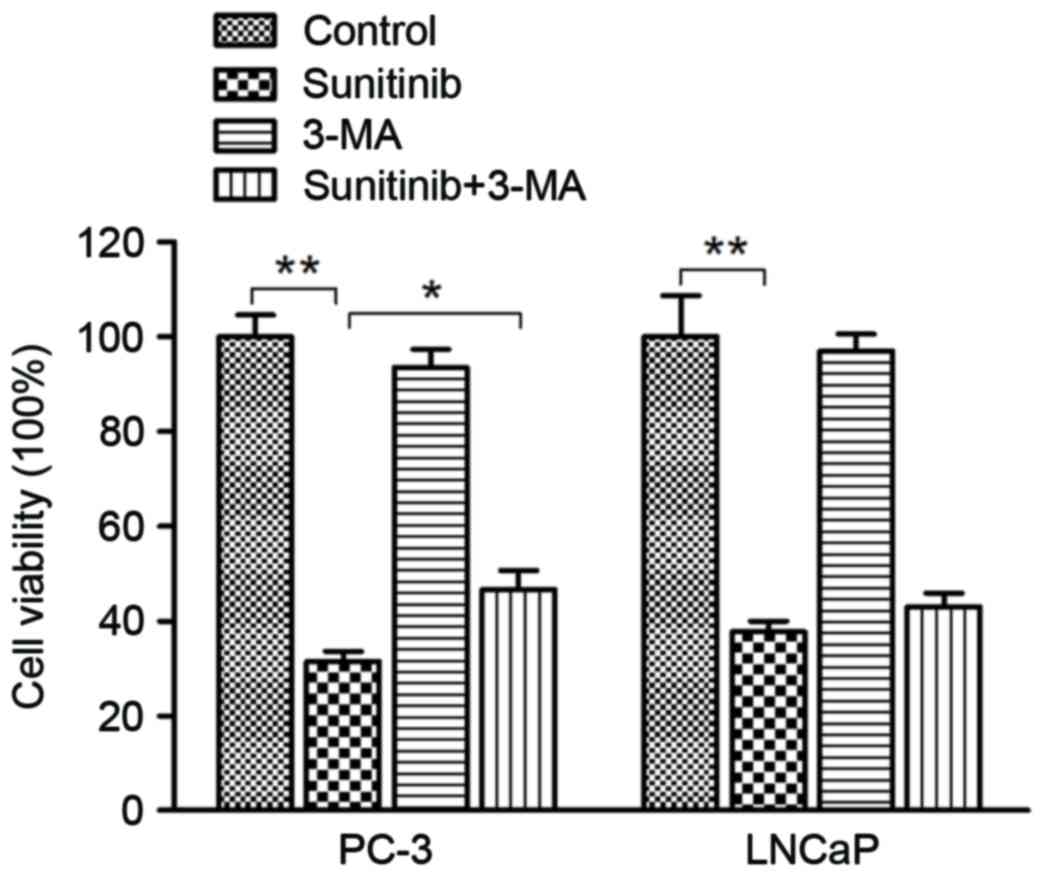|
1
|
Cuzick J, Thorat MA, Andriole G, Brawley
OW, Brown PH, Culig Z, Eeles RA, Ford LG, Hamdy FC, Holmberg L, et
al: Prevention and early detection of prostate cancer. Lancet
Oncol. 15:e484–e492. 2014. View Article : Google Scholar : PubMed/NCBI
|
|
2
|
Gilligan T and Kantoff PW: Chemotherapy
for prostate cancer. Urology. 60 3 Suppl 1:S94–S100. 2002.
View Article : Google Scholar
|
|
3
|
Thakur MK and Vaishampayan U: Multifaceted
and personalized therapy of advanced prostate cancer. Curr Opin
Oncol. 28:222–231. 2016. View Article : Google Scholar : PubMed/NCBI
|
|
4
|
Lum JJ, Bauer DE, Kong M, Harris MH, Li C,
Lindsten T and Thompson CB: Growth factor regulation of autophagy
and cell survival in the absence of apoptosis. Cell. 120:237–248.
2005. View Article : Google Scholar : PubMed/NCBI
|
|
5
|
Tanida I: Autophagosome formation and
molecular mechanism of autophagy. Antioxid Redox Signal.
14:2201–2214. 2011. View Article : Google Scholar : PubMed/NCBI
|
|
6
|
Klionsky DJ, Abdalla FC, Abeliovich H,
Abraham RT, Acevedo-Arozena A, Adeli K, Agholme L, Agnello M,
Agostinis P, Aguirre-Ghiso JA, et al: Guidelines for the use and
interpretation of assays for monitoring autophagy. Autophagy.
8:445–544. 2012. View Article : Google Scholar : PubMed/NCBI
|
|
7
|
Bursch W: The autophagosomal-lysosomal
compartment in programmed cell death. Cell Death Differ. 8:569–581.
2001. View Article : Google Scholar : PubMed/NCBI
|
|
8
|
Mihaylova MM and Shaw RJ: The AMPK
signalling pathway coordinates cell growth, autophagy and
metabolism. Nat Cell Biol. 13:1016–1023. 2011. View Article : Google Scholar : PubMed/NCBI
|
|
9
|
Pyo JO, Nah J and Jung YK: Molecules and
their functions in autophagy. Exp Mol Med. 44:73–80. 2012.
View Article : Google Scholar : PubMed/NCBI
|
|
10
|
Cagnol S and Chambard JC: ERK and cell
death: Mechanisms of ERK-induced cell death-apoptosis, autophagy
and senescence. FEBS J. 277:2–21. 2010. View Article : Google Scholar : PubMed/NCBI
|
|
11
|
Coppin C, Kollmannsberger C, Le L,
Porzsolt F and Wilt TJ: Targeted therapy for advanced renal cell
cancer (RCC): A Cochrane systematic review of published randomised
trials. BJU Int. 108:1556–1563. 2011. View Article : Google Scholar : PubMed/NCBI
|
|
12
|
Gori S, Foglietta J, Rossi M, Hamzaj A,
Stocchi L, Galuppo C, Picece V, Puxeddu E and Furlani L: Sunitinib
therapy in metastatic papillary thyroid cancer. Tumori.
99:285e–287e. 2013.PubMed/NCBI
|
|
13
|
O'Reilly EM, Niedzwiecki D, Hall M, Hollis
D, Bekaii-Saab T, Pluard T, Douglas K, Abou-Alfa GK, Kindler HL,
Schilsky RL, et al: A cancer and leukemia group B phase II study of
sunitinib malate in patients with previously treated metastatic
pancreatic adenocarcinoma (CALGB 80603). Oncologist. 15:1310–1319.
2010. View Article : Google Scholar : PubMed/NCBI
|
|
14
|
Reni M, Cereda S, Milella M, Novarino A,
Passardi A, Mambrini A, Di Lucca G, Aprile G, Belli C, Danova M, et
al: Maintenance sunitinib or observation in metastatic pancreatic
adenocarcinoma: A phase II randomised trial. Eur J Cancer.
49:3609–3615. 2013. View Article : Google Scholar : PubMed/NCBI
|
|
15
|
Uno F, Fujiwara Y and Fujiwara T: A
long-term control of gastrointestinal stromal tumor with sunitinib.
Gan To Kagaku Ryoho. 40:1241–1244. 2013.PubMed/NCBI
|
|
16
|
Broxterman HJ, Gotink KJ and Verheul HM:
Understanding the causes of multidrug resistance in cancer: A
comparison of doxorubicin and sunitinib. Drug Resist Updat.
12:114–126. 2009. View Article : Google Scholar : PubMed/NCBI
|
|
17
|
Fuereder T, Jaeger-Lansky A, Hoeflmayer D,
Preusser M, Strommer S, Cejka D, Koehrer S, Crevenna R and Wacheck
V: mTOR inhibition by everolimus counteracts VEGF induction by
sunitinib and improves anti-tumor activity against gastric cancer
in vivo. Cancer Lett. 296:249–256. 2010. View Article : Google Scholar : PubMed/NCBI
|
|
18
|
Michaelson M Dror, Regan MM, Oh WK,
Kaufman DS, Olivier K, Michaelson SZ, Spicer B, Gurski C, Kantoff
PW and Smith MR: Phase II study of sunitinib in men with advanced
prostate cancer. Ann Oncol. 20:913–920. 2009. View Article : Google Scholar : PubMed/NCBI
|
|
19
|
Jing C, Ning J and Yuanjie N: The
preventative effects of sunitinib malate observed in the course
from non-castration to castration LNCaP xenograft prostate tumors.
J Cancer Res Clin Oncol. 138:2137–2143. 2012. View Article : Google Scholar : PubMed/NCBI
|
|
20
|
Carlisle B, Demko N, Freeman G, Hakala A,
MacKinnon N, Ramsay T, Hey S, London AJ and Kimmelman J: Benefit,
Risk, and outcomes in drug development: A systematic review of
sunitinib. J Natl Cancer Inst. 108:djv2922015. View Article : Google Scholar : PubMed/NCBI
|
|
21
|
Basch E, Loblaw DA, Oliver TK, Carducci M,
Chen RC, Frame JN, Garrels K, Hotte S, Kattan MW, Raghavan D, et
al: Systemic therapy in men with metastatic castration-resistant
prostate cancer: American society of clinical oncology and cancer
care ontario clinical practice guideline. J Clin Oncol.
32:3436–3448. 2014. View Article : Google Scholar : PubMed/NCBI
|
|
22
|
Deretic V and Levine B: Autophagy,
immunity, and microbial adaptations. Cell Host Microbe. 5:527–549.
2009. View Article : Google Scholar : PubMed/NCBI
|
|
23
|
Chen S, Rehman SK, Zhang W, Wen A, Yao L
and Zhang J: Autophagy is a therapeutic target in anticancer drug
resistance. Biochim Biophys Acta. 1806:220–229. 2010.PubMed/NCBI
|
|
24
|
Jin S and White E: Role of autophagy in
cancer: Management of metabolic stress. Autophagy. 3:28–31. 2007.
View Article : Google Scholar : PubMed/NCBI
|
|
25
|
Favata MF, Horiuchi KY, Manos EJ, Daulerio
AJ, Stradley DA, Feeser WS, Van Dyk DE, Pitts WJ, Earl RA, Hobbs F,
et al: Identification of a novel inhibitor of mitogen-activated
protein kinase kinase. J Biol Chem. 273:18623–18632. 1998.
View Article : Google Scholar : PubMed/NCBI
|
|
26
|
Fukazawa H, Noguchi K, Murakami Y and
Uehara Y: Mitogen-activated protein/extracellular signal-regulated
kinase kinase (MEK) inhibitors restore anoikis sensitivity in human
breast cancer cell lines with a constitutively activated
extracellular-regulated kinase (ERK) pathway. Mol Cancer Ther.
1:303–309. 2002.PubMed/NCBI
|
|
27
|
Johnson VL, Ko SC, Holmstrom TH, Eriksson
JE and Chow SC: Effector caspases are dispensable for the early
nuclear morphological changes during chemical-induced apoptosis. J
Cell Sci. 113:2941–2953. 2000.PubMed/NCBI
|
|
28
|
Motzer RJ, Hutson TE, Tomczak P,
Michaelson MD, Bukowski RM, Rixe O, Oudard S, Negrier S, Szczylik
C, Kim ST, et al: Sunitinib versus interferon alfa in metastatic
renal-cell carcinoma. N Engl J Med. 356:115–124. 2007. View Article : Google Scholar : PubMed/NCBI
|
|
29
|
Demetri GD, van Oosterom AT, Garrett CR,
Blackstein ME, Shah MH, Verweij J, McArthur G, Judson IR, Heinrich
MC, Morgan JA, et al: Efficacy and safety of sunitinib in patients
with advanced gastrointestinal stromal tumour after failure of
imatinib: A randomised controlled trial. Lancet. 368:1329–1338.
2006. View Article : Google Scholar : PubMed/NCBI
|
|
30
|
Sonpavde G, Periman PO, Bernold D,
Weckstein D, Fleming MT, Galsky MD, Berry WR, Zhan F, Boehm KA,
Asmar L and Hutson TE: Sunitinib malate for metastatic
castration-resistant prostate cancer following docetaxel-based
chemotherapy. Ann Oncol. 21:319–324. 2010. View Article : Google Scholar : PubMed/NCBI
|
|
31
|
Diaz R, Nguewa PA, Redrado M, Manrique I
and Calvo A: Sunitinib reduces tumor hypoxia and angiogenesis, and
radiosensitizes prostate cancer stem-like cells. Prostate.
75:1137–1149. 2015. View Article : Google Scholar : PubMed/NCBI
|
|
32
|
Wang ZH, Li Q, Ruan SQ, Xiao Q, Liu Y, Hu
YT, Hu LF, Chen HY, Zheng S, Zhang SZ and Ding KF: Sunitinib
mesylate inhibits proliferation of human colonic stromal
fibroblasts in vitroin vivo. J Zhejiang Univ Sci B. 15:701–712.
2014. View Article : Google Scholar : PubMed/NCBI
|
|
33
|
Di Desidero T, Fioravanti A, Orlandi P,
Canu B, Giannini R, Borrelli N, Man S, Xu P, Fontanini G, Basolo F,
et al: Antiproliferative and proapoptotic activity of sunitinib on
endothelial and anaplastic thyroid cancer cells via inhibition of
Akt and ERK1/2 phosphorylation and by down-regulation of cyclin-D1.
J Clin Endocrinol Metab. 98:E1465–E1473. 2013. View Article : Google Scholar : PubMed/NCBI
|
|
34
|
Shimizu S, Kanaseki T, Mizushima N, Mizuta
T, Arakawa-Kobayashi S, Thompson CB and Tsujimoto Y: Role of Bcl-2
family proteins in a non-apoptotic programmed cell death dependent
on autophagy genes. Nat Cell Biol. 6:1221–1228. 2004. View Article : Google Scholar : PubMed/NCBI
|
|
35
|
Bolt AM, Zhao F, Pacheco S and Klimecki
WT: Arsenite-induced autophagy is associated with proteotoxicity in
human lymphoblastoid cells. Toxicol Appl Pharmacol. 264:255–261.
2012. View Article : Google Scholar : PubMed/NCBI
|
|
36
|
Levine B and Klionsky DJ: Development by
self-digestion: Molecular mechanisms and biological functions of
autophagy. Dev Cell. 6:463–477. 2004. View Article : Google Scholar : PubMed/NCBI
|
|
37
|
Kabeya Y, Mizushima N, Ueno T, Yamamoto A,
Kirisako T, Noda T, Kominami E, Ohsumi Y and Yoshimori T: LC3, a
mammalian homologue of yeast Apg8p, is localized in autophagosome
membranes after processing. EMBO J. 19:5720–5728. 2000. View Article : Google Scholar : PubMed/NCBI
|
|
38
|
Klionsky DJ: Coming soon to a journal near
you-the updated guidelines for the use and interpretation of assays
for monitoring autophagy. Autophagy. 10:16912014. View Article : Google Scholar : PubMed/NCBI
|
|
39
|
Ikeda T, Ishii KA, Saito Y, Miura M,
Otagiri A, Kawakami Y, Shimano H, Hara H and Takekoshi K:
Inhibition of autophagy enhances sunitinib-induced cytotoxicity in
rat pheochromocytoma PC12 cells. J Pharmacol Sci. 121:67–73. 2013.
View Article : Google Scholar : PubMed/NCBI
|
|
40
|
Santoni M, Amantini C, Morelli MB,
Liberati S, Farfariello V, Nabissi M, Bonfili L, Eleuteri AM,
Mozzicafreddo M, Burattini L, et al: Pazopanib and sunitinib
trigger autophagic and non-autophagic death of bladder tumour
cells. Br J Cancer. 109:1040–1050. 2013. View Article : Google Scholar : PubMed/NCBI
|
|
41
|
Wang SH, Shih YL, Ko WC, Wei YH and Shih
CM: Cadmium-induced autophagy and apoptosis are mediated by a
calcium signaling pathway. Cell Mol Life Sci. 65:3640–3652. 2008.
View Article : Google Scholar : PubMed/NCBI
|
|
42
|
Sivaprasad U and Basu A: Inhibition of ERK
attenuates autophagy and potentiates tumour necrosis
factor-alpha-induced cell death in MCF-7 cells. J Cell Mol Med.
12:1265–1271. 2008. View Article : Google Scholar : PubMed/NCBI
|
|
43
|
Corcelle E, Nebout M, Bekri S, Gauthier N,
Hofman P, Poujeol P, Fénichel P and Mograbi B: Disruption of
autophagy at the maturation step by the carcinogen lindane is
associated with the sustained mitogen-activated protein
kinase/extracellular signal-regulated kinase activity. Cancer Res.
66:6861–6870. 2006. View Article : Google Scholar : PubMed/NCBI
|
|
44
|
Fenton MS, Marion KM, Salem AK, Hogen R,
Naeim F and Hershman JM: Sunitinib inhibits MEK/ERK and SAPK/JNK
pathways and increases sodium/iodide symporter expression in
papillary thyroid cancer. Thyroid. 20:965–974. 2010. View Article : Google Scholar : PubMed/NCBI
|
|
45
|
Voce P, D'Agostino M, Moretti S,
Sponziello M, Rhoden K, Calcinaro F, Tamburrano G, Tallini G,
Puxeddu E, Filetti S, et al: Sunitinib inhibits tumor vascularity
and growth but does not affect Akt and ERK phosphorylation in
xenograft tumors. Oncol Rep. 26:1075–1080. 2011.PubMed/NCBI
|
|
46
|
Lin CI, Whang EE, Moalem J and Ruan DT:
Strategic combination therapy overcomes tyrosine kinase
coactivation in adrenocortical carcinoma. Surgery. 152:1045–1050.
2012. View Article : Google Scholar : PubMed/NCBI
|
|
47
|
Jung CH, Jun CB, Ro SH, Kim YM, Otto NM,
Cao J, Kundu M and Kim DH: ULK-Atg13-FIP200 complexes mediate mTOR
signaling to the autophagy machinery. Mol Biol Cell. 20:1992–2003.
2009. View Article : Google Scholar : PubMed/NCBI
|
|
48
|
Nazio F, Strappazzon F, Antonioli M,
Bielli P, Cianfanelli V, Bordi M, Gretzmeier C, Dengjel J,
Piacentini M, Fimia GM and Cecconi F: mTOR inhibits autophagy by
controlling ULK1 ubiquitylation, self-association and function
through AMBRA1 and TRAF6. Nat Cell Biol. 15:406–416. 2013.
View Article : Google Scholar : PubMed/NCBI
|
|
49
|
Hosokawa N, Hara T, Kaizuka T, Kishi C,
Takamura A, Miura Y, Iemura S, Natsume T, Takehana K, Yamada N, et
al: Nutrient-dependent mTORC1 association with the
ULK1-Atg13-FIP200 complex required for autophagy. Mol Biol Cell.
20:1981–1991. 2009. View Article : Google Scholar : PubMed/NCBI
|
|
50
|
Hac A, Domachowska A, Narajczyk M, Cyske
K, Pawlik A and Herman-Antosiewicz A: S6K1 controls autophagosome
maturation in autophagy induced by sulforaphane or serum
deprivation. Eur J Cell Biol. 94:470–481. 2015. View Article : Google Scholar : PubMed/NCBI
|
|
51
|
Yan L, Vatner DE, Kim SJ, Ge H, Masurekar
M, Massover WH, Yang G, Matsui Y, Sadoshima J and Vatner SF:
Autophagy in chronically ischemic myocardium. Proc Natl Acad Sci
USA. 102:13807–13812. 2005. View Article : Google Scholar : PubMed/NCBI
|
|
52
|
Notte A, Leclere L and Michiels C:
Autophagy as a mediator of chemotherapy-induced cell death in
cancer. Biochem Pharmacol. 82:427–434. 2011. View Article : Google Scholar : PubMed/NCBI
|
|
53
|
Donato AL, Huang Q, Liu X, Li F, Zimmerman
MA and Li CY: Caspase 3 promotes surviving melanoma tumor cell
growth after cytotoxic therapy. J Invest Dermatol. 134:1686–1692.
2014. View Article : Google Scholar : PubMed/NCBI
|
|
54
|
Beltran H, Kaur G, de España CG and Tagawa
ST: Exploring the role of anti-angiogenic therapies in prostate
cancer: Results from the phase 3 trial of sunitinib. Asian J
Androl. 16:568–569. 2014. View Article : Google Scholar : PubMed/NCBI
|






















